|
I made the case in my last blog that we may be embracing sin, because we think we can control our sin nature. This is an idea not lost on Satan, our adversary, whose primary goal is keeping us separated from a real and life-transforming relationship with Almighty God. Today, I want to address some of the instruction of Scripture regarding repentance, words from the very heart of a loving God who loves us but despises our sin. When we accept Christ as the Lord of our life, Scripture tells us that there is a change in our life, that we have been made new. However, Scripture doesn't promise the "removal" of our sin nature...nor the charming nature it possesses that so easily lures us to refocus our attention away from God's commands. God’s Word gives us some pretty clear instruction on how to keep the momentum of our new life in Christ surging forward towards the "new self" or the "new creation" that our Lord desires. It all has to do with the focus of our heart… “Since, then, you have been raised with Christ, set your hearts on things above, where Christ is, seated at the right hand of God. Set your minds on things above, not on earthly things… Put to death, therefore, whatever belongs to your earthly nature: sexual immorality, impurity, lust, evil desires and greed, which is idolatry. Because of these, the wrath of God is coming. You used to walk in these ways, in the life you once lived. But now you must also rid yourselves of all such things as these: anger, rage, malice, slander, and filthy language from your lips. Do not lie to each other, since you have taken off your old self with its practices and have put on the new self, which is being renewed in knowledge in the image of its Creator.” – Colossians 3:1,2 and 5-10 (NIV) This is pretty succinct direction from a God who pulls no punches in addressing the things that He knows will trip us up in our walk towards Him and with Him. The idea of “setting our heart on things above” is the very first step toward a repentant life. We’re probably not willing to walk away from the sinful things that we think make this life so “enjoyable” until we realize just how remarkable our God really is! We give up nothing of value when we surrender our life of sin to the perfect will of God; however, we give up much when we unrepentantly embrace sin over righteousness. When thoroughly examined, the trade-off should be an easy one. Isaiah 61:3 gives us a brief hint as to what God offers those who seek Him. It says, “…he will give a crown of beauty for ashes, a joyous blessing instead of mourning, festive praise instead of despair.” Our instruction is to fully concentrate on the beauty found in living a life holy and set apart for God’s use…a life of determined repentance of the sin that contaminates our life and destroys everything it touches. Notice that we are not told to revisit sin on occasion; instead, we are instructed to “put to death” the things that belong to our sinful nature, and some of them are named: immorality, lust, greed, idolatry, anger, malice, slander, lies…basically, the very things that we see prevailing in today’s society...the very things that mark the condition of the world before the return of Christ. The passage in Colossians tells us that “we must rid ourselves of all such things.” We certainly don’t rid ourselves of any sin by the revisitation of it, nor do we rid ourselves of sin by “asking forgiveness for it.” Feeling convicted about sin, crying tears, or confessing sin doesn’t rid us of the problem either. It is only through true repentance, a changing of our mind and a redirection of our course, that sin can truly be addressed and cast away from the equation of our life. Next: Repentance: Defying Satan Power in the Journey
0 Comments
We’ve discussed the definition of repentance, repentance in culture, and repentance as portrayed in cultural christianity. Today, let’s look at how we personally see our sin. Do we view it as dangerous, or do we diminish its effect on our life? Maybe we think we can control our desire to participate in sin...or stop our pursuit of it once that sin has been "tasted?" Our view will ultimately define our idea regarding the importance of repentance. Clinging to Salvation While Retaining Our Affinity for Sin I would say that many among us, if not all of us taking the time to read a Christian blog, would admit that we desperately cling to salvation. Salvation is the foundation of our eternal hope. However, in the interim, between here and our eternal home, are we also clinging to sin...on purpose? Let’s admit that we find many sins attractive. It’s something we often desire to do, because our flesh nature seems to always be starving. Our sin nature is frequently more hungry than our thirst for righteousness is thirsty, and it's screaming to be fed. And then there's Satan…well, we know that he’s the best salesman for convincing us that “one taste” of sin won’t hurt us…because sin is "forgivable," and "God will understand." Remember, we have grace, and we’ve “culturally established” it to be cheap and easy to abuse. So, go ahead and sin…feel good about it, because God loves you and wants you to be entertained. Moreover, God will bend His perfect will around that cheap grace in a manner that allows us the comfort to do as we please. Or, maybe not... Here we find one of the most important components of the spiritual war that rages all around us…our view of sin and the importance of repentance. Humanistic Lordship…Thinking We’re in Control We love to claim Jesus as our Savior, but our native sin nature hesitates to surrender to Him as Lord. At the core of this hesitation is our tendency to be obedient to self alone, lacking a true desire to serve anyone or anything that doesn’t serve our whims and our very self-centered ideals. We often convince ourselves that we can control our sin nature, because we are strong and always in complete control of our life (humanism). We think that we can wade into a "little sin" every now and then, for amusement and satisfaction of the flesh, but we can stop at any time…or can we? The Example of A Look Too Long Marriages do not end because a spouse “suddenly and unexpectedly” cheats. Sin is not innocent, and it's seldom, if ever, accidental. It all begins with a controlled and intentional choice to stop and “look too long” at another, through lustful and sinful eyes…eyes that are seeking rebellion against God for personal gain or enjoyment. Those looks turn into deliberate thoughts, planting the early seeds of infidelity and secretly watering them along the way. In this case, the “looking” spouse absolutely knows that even their thoughts are wrong, but they continue to return to them. They continue to feed and water them, and that which is fed and watered will ultimately grow. Frankly, it will flourish. Too many times, the intentional and reoccurring visits to the sin that we think we can control end in personal and spiritual catastrophe. Families are left devastated in their wake. That first look, the one that was intentionally longer than it should have been, can easily turn into a marriage-ending adulterous affair, breaking the marriage covenant between the man and woman and between the cheating spouse and God. Where did they lose control? I would venture the thought that the loss of control began when they made their very first choice to return to that sin and not repent and not walk immediately away from that which they knew to be wrong. It’s on that second visit that they begin to compromise their spiritual integrity and character and redefine their foundational morals, because, at that point, they have already made the choice to "embrace" a little rebellion…and, it’s a desperately slippery slope from that point forward. Sin grows because of our purposed interaction with it. It grows because we visit with it…time and time again, often in secret. We make it a friend. We enjoy its company, and we convince ourselves that our affair with sin will be short...but it never is. The more we play with sin, the more attractive it becomes, and the less cognizant we are of the damage it is actually doing in our life. Playing God with Our Weaknesses We think we can handle a little “look” that’s too long…or a little depravity of thought. Possibly, we feel that sharing a little lie regarding someone else is innocent enough to revisit with others who may find it interesting? Maybe it’s viewing a little pornography or stealing…just a little? Or, we may just harbor resentment towards our fellow man…a bitterness that we have learned to embrace regarding someone else? It's actually become a comfort in our life, because it makes us feel better about ourselves, if only for the moment. We know it’s wrong, but we can handle it, because we’re strong and in control. No one really knows about it, and we’ll repent later, because right now the enjoyment outweighs our guilt. But, the call of Scripture remains… and it cries out: “Repent.” Turn away from sin, and stop revisiting it. Stop befriending it. If we truly love the Lord, and if we truly seek to become the “new creation” that God intends, then we must be willing to release our firm grasp on that which Christ came to save us from…that which separates us from the intimate relationship that God desires. We should know that giving into sin is a choice to place something else in God's rightful place in our life. When we give in to sin, we give up God at that moment...replacing Him and His commands for the pursuit of our own fancy. We become Lord. We all struggle with our sin nature, because we struggle with lordship. It’s much easier to sin than it is to address a change in our desire to sin. But, the change must be from the inside out, and it starts with our release of control, admitting our weakness in desiring to sin in the first place, and setting our mind on Christ and not on the things that enslave us to a sinful and worldly existence in this life. It starts with a frank and honest reevaluation of exactly how we view sin, our weakness, and the repentant nature that should mark the life of every disciple of Christ. Next: Repentance- Seeing Our Sin Differently: The Instruction of Scripture
Our current culture is flowing in the direction of humanism (the belief that man is God). No “Christian" would want to readily admit that, but the lives that many live often reflect a humanistic mentality. We demand to be heard, and we demand that our needs are met. We demand a life of unaccountability to anyone. And we demand to be found guiltless, regardless of our actions. And so, we demand a religion that eloquently caters to those whims. As I mentioned in my previous blog, modern culture has done a great job of whitewashing sin almost entirely away from the discussion, because sin is offensive and ugly to confront. Talk of sin makes people uneasy, and conviction brings about a recognition of the glaring guilt of all humanity. The preference of modern culture is to just leave the discussion of sin alone, sidestepping the thought of repentance while only concentrating on God’s great love for us. We’ve elevated the attractive elements of "religion" and diminished the unattractive truth of our sin. We’ve streamlined our churches, enhancing their appearance and ministries to become a sort of “eye-candy” for a generation of large crowds who seek professional and guiltless times of worship. The real message of the Gospel, one that displays fully the depravity of man and his great need for a Savior, is replaced by a message of a God who wants to give us things because He loves us so much. It’s a very attractive message in a culture of humanistic greed, and people will flock to it by the millions. Many modern day preachers will not even touch the idea that repentance of sin is integral to the life of the disciple of Christ. The crowds may become offended and seek out another venue in their quest for the “perfect” God for them. Yet, the message of Scripture is quite clear, “Repent, for the kingdom of God has come near.” (Matthew 4:17) Culture is concerned with looks, comfort, and everything material. And often, cultural Christianity is concerned with much similar things. Culture would drive us to attend a church with cutting-edge ministries and large contemporary sanctuaries full of arena seats, professional lighting, and outstanding worship bands backlit like a concert. If your church is running fog machines on Sunday morning…well, never mind… The media presentations of our church should be slick and polished, and the coffee shop out front should rival Starbucks. The pastor should be a narcissistic rock star…and, if he doesn’t have a podcast…well, he may not be “relevant” to culture. He should always make us feel good about God’s love for us, but he should never impose even a passing notion that we may be guilty of anything...ever. If we attend such a church, one with great concert style worship, “relevant” messages (eloquently delivered on simulcast) espousing our unmerited favor in God’s eyes, and great coffee, then our salvation, and our love of God is validated…right? If we go to a culturally acceptable church, with a culturally acceptable message, then everyone is happy, well entertained, and remarkably comfortable. There’s never a challenge issued to address what the Bible really says concerning our sin. Repent. The need for repentance is often hidden under the trinkets that wealth and sleek shiny religion can purchase. But, the sickness remains, and it is internal. Our sickness is a sin nature that is native to our flesh, and it’s a nature that has desperately sought to undermine God since Eve first chatted with a snake in the Garden of Eden…a snake who would become the lord of modern day cultural thinking. And so, we have a desperate need for repentance...a desperate need to make Christ Lord. Religion is important to our culture, but Lordship may not be.
We have to decide if we are willing to serve God, or serve the attractive nature of a God-diminishing culture. Culture Christianity can often make the true message of God in Scripture undesirable…but regardless of our intentions, someone or some thing will be God in our life. It may be ourselves. It may be culture. And, we have to choose wisely… Joshua 24:15 says, “But if serving the Lord seems undesirable to you, then choose for yourselves this day whom you will serve, whether the gods your ancestors served beyond the Euphrates, or the gods of the Amorites, in whose land you are living. But as for me and my household, we will serve the Lord.” Repentance is essential to our life in Christ. We cannot hold firmly to our sin and think we are drawing closer to a God who willingly sacrificed Christ for the payment of that sin. Don’t allow cultural christianity to dissuade us from acknowledging our guilt, and the command of God to repent. Trying to convince ourselves that we truly love God without real and intentional repentance is like kissing the hand of Christ to mark the spot where we plan on driving the nail. Clearly, in 2017, we are seeing a distinct change in the foundational teachings of Christianity. Strangely to some, the precepts of God’s law has never changed…none of them…not even once. However, those precepts have certainly been watered down by many over the years, many who would seek to fit them into a cozy box of “options” for the would-be disciple of Christ. We see this reflected in culture today. A diluted view of repentance and a cheapening of grace. Culture has reexamined grace, and they have cheapened it. They have done a fairly thorough job of washing the guilt of mankind cleanly away from the discussion, as if sin doesn’t really exist. They have taught Jesus to be a wonderful, loving, and merciful Savior, and He certainly is, while they have failed to emphasize our guilt as the very reason Christ had to die in the first place. And, we’ve redefined terms, such as repentance, to fit comfortably into the mainstream. It’s a change of theology…”if you sin, which you probably won’t, just utilize cheap grace, and ask forgiveness for it until it happens again.” If we are to truly be followers of a resurrected and living Christ, we need do much more than simply ask for the forgiveness of our sins. Frankly, upon true conversion to the lordship of Christ in our life, the eternal consequences of our sin is already forgiven, but check that we have a clear understand that the earthly consequences of that sin, for us and others, are not escaped. Therefore, the instruction of Scripture is to “repent,” to change our mind regarding the sins that we deliberately embrace, and to turn from them, (180 degrees/directly away) marching on in a new direction…the direction of Christ and God’s will. Sinning, asking forgiveness for it, and then sinning again in the same manner the next day, is not the idea of “new creation” reflected in 2 Corinthians 5:17: “Therefore, if anyone is in Christ, the new creation has come: The old has gone, the new is here!” When we live under the premise that we simply need to ask forgiveness for our trampling of God’s law, without changing the mindset that led us to that very sin in the first place, then we, in effect, cheapen the blood of Christ…the very blood that paid for our redemption in the eyes of Almighty God. A follower of Christ, absent a true heart of repentance, is, at the very best, a lukewarm follower, prone to wander away, all the while feeling good that he can ask a cheapened forgiveness when his “guiltless sinning is done.” When we weigh the cost of our salvation against the waffling moodiness of our true conviction of the effects of sin in our life, what takes the higher priority? We value our salvation, yet we find it so hard to turn away from our embrace of the very things that Christ died to save us from…the very things that separate us, as a person and a culture, from a Christ who died for our right to choose Him. Up Next: Repentance and Cultural Christianity This is the first installment in a new series of blogs regarding "Turning From Sin." part.01- repentance: establishing the proper definition To effectively turn from sin, we must establish a life-applicable definition for one very distinct term: repentance. There is a clear call in Acts 2:38 to "Repent and be baptized, every one of you, in the name of Jesus Christ for the forgiveness of your sins. And you will receive the gift of the Holy Spirit.”
Of course, to “repent” means that we are to ask forgiveness for our sins...Right? Consequently, the word “repent” could possibly benefit from closer examination, because it has nothing to do with "asking forgiveness for anything. With the revealing of that information, three church steeples just exploded across the Bible belt, and mainstream Christianity will have to rewrite quite a few self-help books on how to live happily for Jesus while confidently living out a life of deliberate but “easily forgivable sin,” while seated comfortably in the Lordship of our own will. But, what does the word “repentance” really mean? The word repent is the Greek verb “metanoeó.” It’s a compound word, and it joins “metá” (changed after being with) and “noiéō” (think different after). Literally, it means a change of mind, or to think differently afterwards. Notice, there’s no component of this compound word that even hints at “asking forgiveness.” None. Repentance is a definitive redirection of our thinking toward something, specifically where our actions are concerned. It does not illustrate a moody or lukewarm state of evaluation that is subject to change under the slightest application of outside pressure. We should be keenly aware that shedding tears over our sin, feeling conviction, and even the confessing of our sin all fall outside the parameters of the real definition of the word. We can experience conviction, cry, and confess all we want. If we keep returning to the same sins, we haven’t repented of them. Repentance is deliberate, purposed, and settled. If taken in its true form, repentance illustrates a solid and intentional changing of our mind from one thing (or way) to another. So, the command to “repent of our sins” is not a call to ask forgiveness for them, but it is a call to “change our mind” about further participation in sin from that point forward. An interesting side note…the word “repent” was also used by the Greek military as a command to “about-face,” or “turn around.” Moreover, there was no call to stop marching. So, the term “repent” was called out to soldiers while they marched, instructing them to turn 180 degrees from their current direction of travel, and then to continue marching forward in a new direction. They had altered course, a definitive change of direction, and marched away…leaving their old destination behind them. Let’s be sure to understand the importance of real repentance and not cheapen it by a more comfortable definition of our own terms. I thank God for the forgiveness of sins, but we must learn that true repentance involves a discipline changing of our mind regarding our involvement in sin. Next Blog: Repentance and Culture |
AuthorKeith Beatty is a Worship, Missions and Media Pastor living in North Alabama. He's excited and very humbled to be a follower of Jesus Christ! Archives
April 2023
Categories |
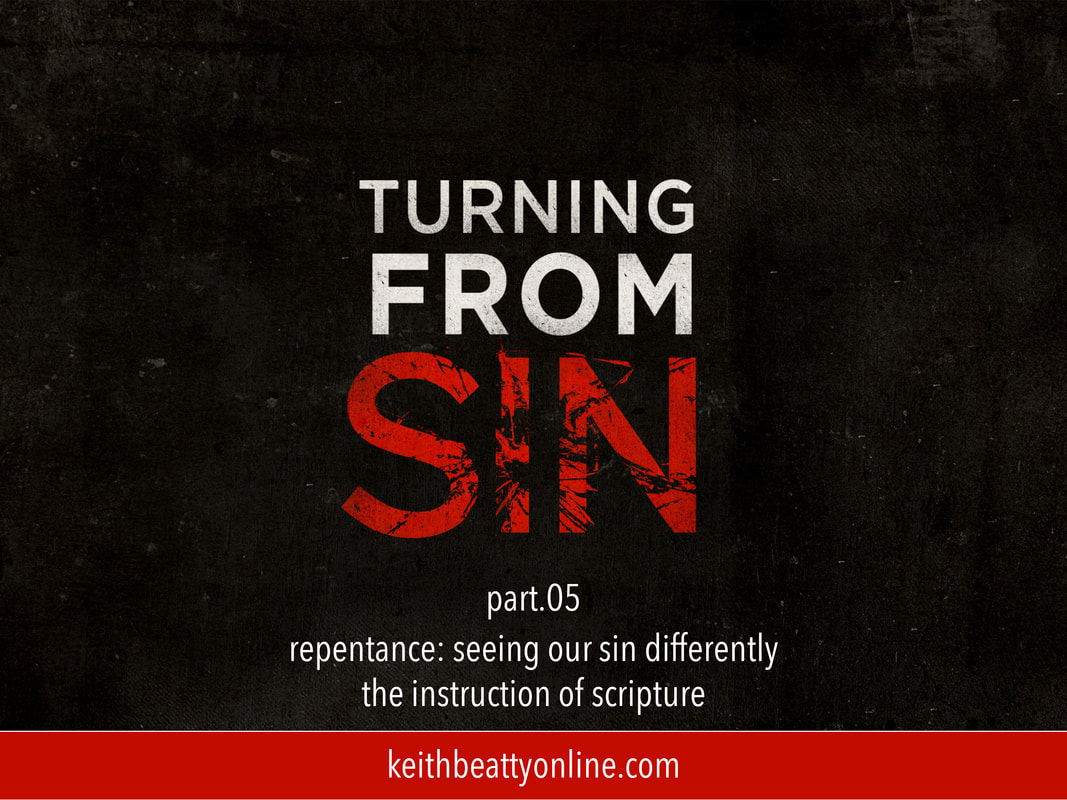
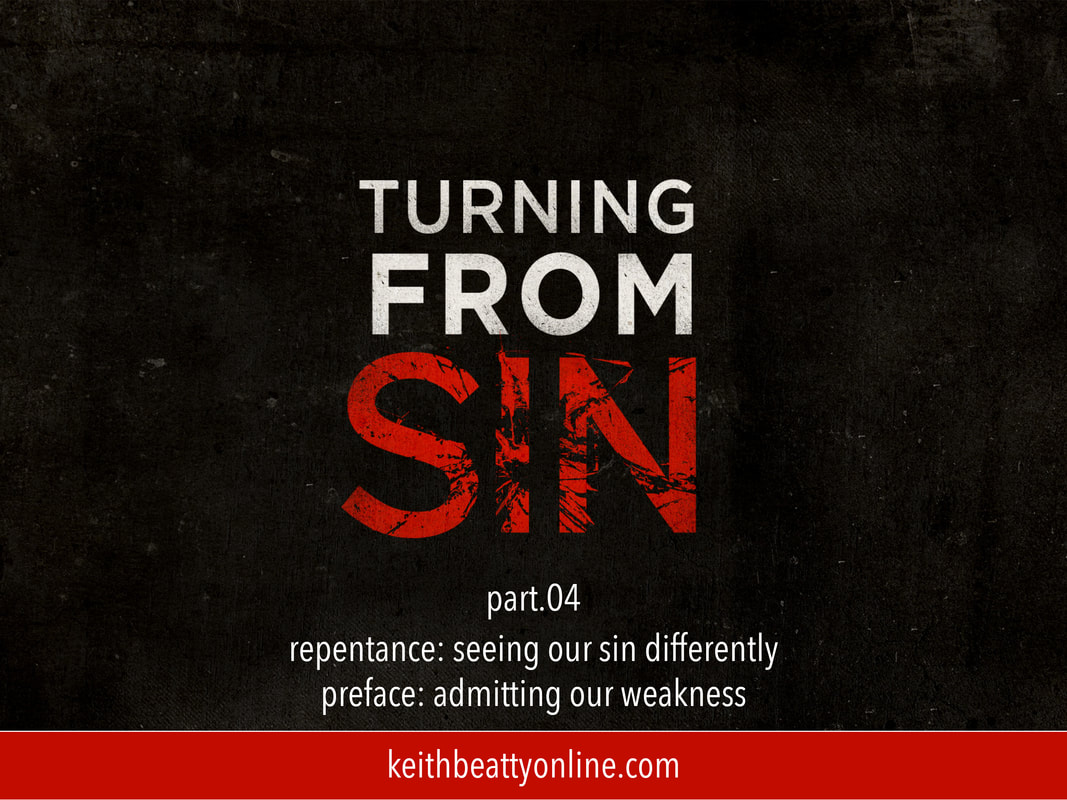
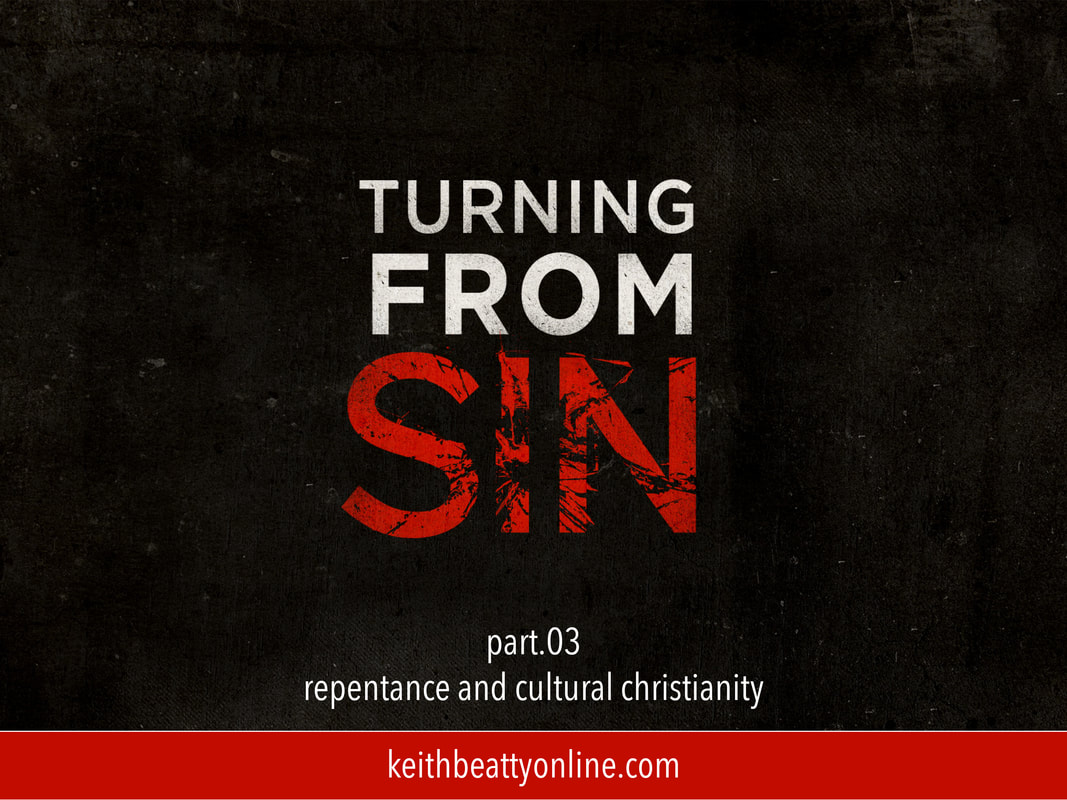
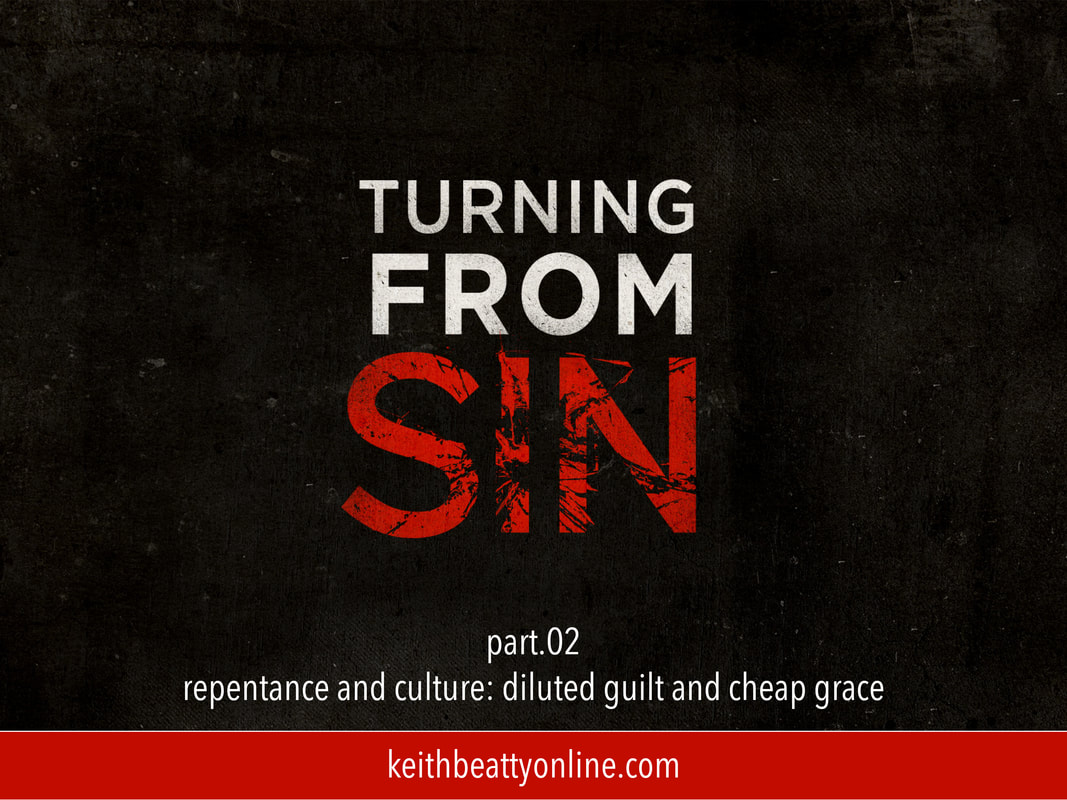
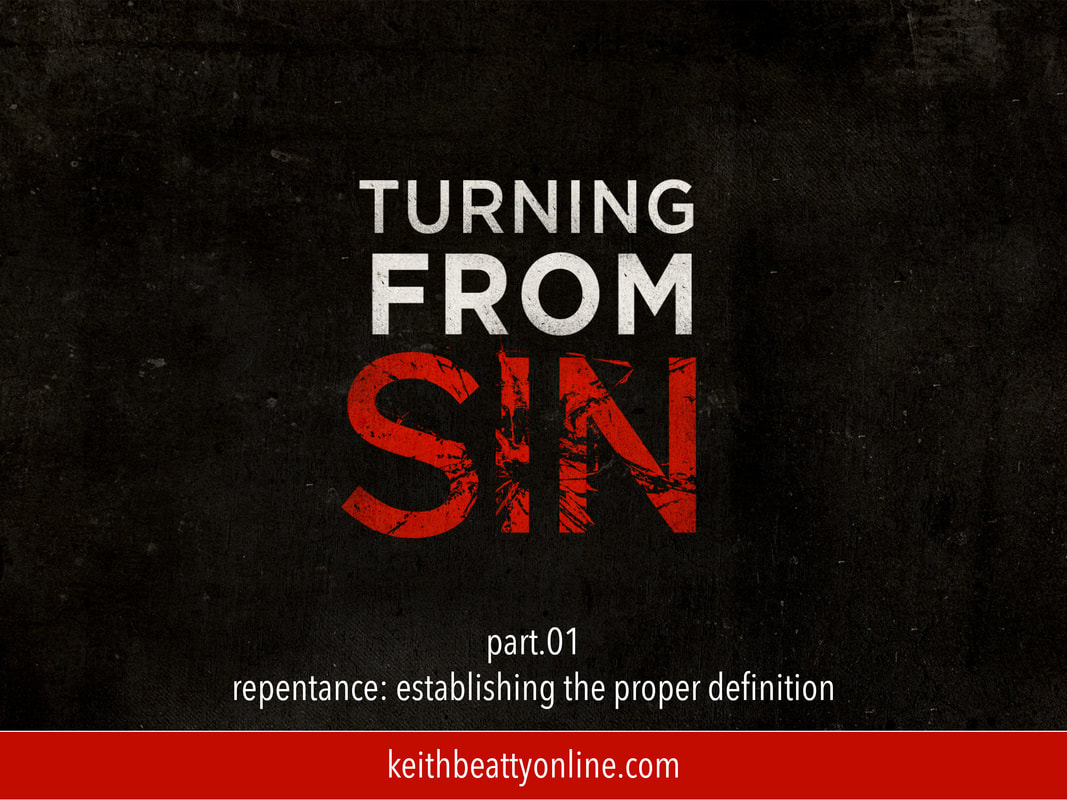

 RSS Feed
RSS Feed